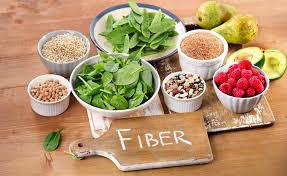To stay healthy, you need to pay special attention to maintaining a balanced diet. You should supply your body with important nutrients to stay fit. Along with consuming food rich in vitamins and minerals, you should also consider increasing your intake of fiber. As per the U.S. Dietary Guidelines, you should be getting 25-30g of dietary fiber a day, but statistics show that most people do not get more than 15g a day. The effects of eating more fiber are quite impressive actually. It improves your overall health in many different ways.

Types of Fiber
Before going any further, it is important to understand that dietary fiber can be of two main types. It can be soluble fiber or insoluble fiber. Both types will offer different types of health benefits. For instance, soluble fiber is the type that converts into a gel-like substance in your gut. It helps a lot to lower blood glucose and cholesterol levels. You can find enough of it in peas, oats, apples, beans, carrots, citrus fruits, and psyllium.
On the other hand, insoluble fiber maintains its form in water and adds bulk to your stool. It helps maintain the health of your digestive system. You can get plenty of insoluble fiber from wheat bran, nuts, and some veggies, such as green beans, cauliflower, and potatoes. Interestingly, beans, oatmeal, and many plant foods provide you with both soluble and insoluble fiber.
Effects of Eating More Fiber
As mentioned already, most people do not get the recommended daily intake of dietary fiber. Therefore, it is important to include more fiber-rich foods in your diet to improve your overall health. Here is more about the effects of eating more fiber.
1. You Notice a Reduction in Cholesterol
Eating more fiber will have a direct impact on your blood cholesterol levels. By lowering your cholesterol levels, you can lower your risk of heart disease, obesity, stroke, and type-2 diabetes. Your aim should be to get soluble fiber because it lowers LDL cholesterol and reduces inflammation in the body. Soluble fiber turns into a gel-like substance and binds the cholesterol in the small intestine. Your body cannot absorb that cholesterol and it goes out of your body.
2. You Lower Risk of Kidney Stones
Statistics show that one in 10 people in the U.S. are suffering from kidney stones, but you can lower your risk simply by increasing more fiber in your diet. By eating fiber-rich food like fruits and veggies, you can make your urine less acidic, which discourages the formation of kidney stones. You should also increase your intake of water to lower the incidence of kidney stones.
3. You Have Healthy Digestion
When you increase your intake of dietary fiber, it directly affects the digestive system in a positive way. Fiber makes it easier for food to move through your digestive tract. It also adds bulk to your stool and prevents constipation and other digestive issues. Some studies have found that getting more fiber from your diet also lowers your risk of diverticulitis, a condition characterized by inflammation in the walls of the colon. Moreover, the healthy bacteria in your gut survive on fiber, and by feeding them, you will be able to improve digestion of food. Just by eating a high-fiber diet for a few days, you will be able to increase the number of gut bacteria that promote better digestive health.
4. You Lower Risk of Diabetes
One of many effects of eating more fiber is that it lowers your risk of developing diabetes. Many studies have confirmed that people who are on a fiber-rich diet are at a reduced risk of developing diabetes. Just by getting more than 26g of fiber a day, you may end up lowering your risk of diabetes by 18%.
5. You Have a Healthy Body Weight
Eating more fiber will help you have a healthy body weight. Not only can you lower body weight by eating more fiber, but you can also help keep it at a healthy level. Soluble fiber turns into a gel-like substance in your gut, which increases a feeling of satiety. It means that you are less likely to feel hungry for a long time after eating a fiber-rich meal. By controlling your appetite, you can control the number of calories you eat, which in turn will prevent weight gain. Fiber also helps stabilize your blood sugar levels, which is why you are less likely to deal with hunger pangs after eating a fiber-rich meal.
6. You Feel Energized
Within a few days of eating more fiber, you will begin to feel more energized. That energy is the result of a properly functioning digestive system. Improved digestion of food will limit the release of glucose into your bloodstream. This stabilizes blood sugar levels and you feel more energized throughout the day.
7. You Stay Protected from Cancer
One of many effects of eating more fiber is that it increases your immunity against certain cancer types. Studies show that every 10g of fiber you eat leads to a 10% reduction in your risk of colorectal cancer. It also lowers your risk of breast cancer. Many fiber-rich foods provide you with loads of antioxidants and phytochemicals that prevent oxidative damage to cells in your body.
8. You Detoxify Your Body
When you eat more fiber, you support the natural detoxification mechanism in your body. Studies have shown that eating more fiber helps eliminate toxins from your gastrointestinal tract because it soaks up harmful compounds, such as unhealthy fats and excess estrogen. Insoluble fiber ensures that food moves through your intestine quickly, which limits the amount of time harmful chemicals, like mercury, BPA, and pesticides stay in your system.